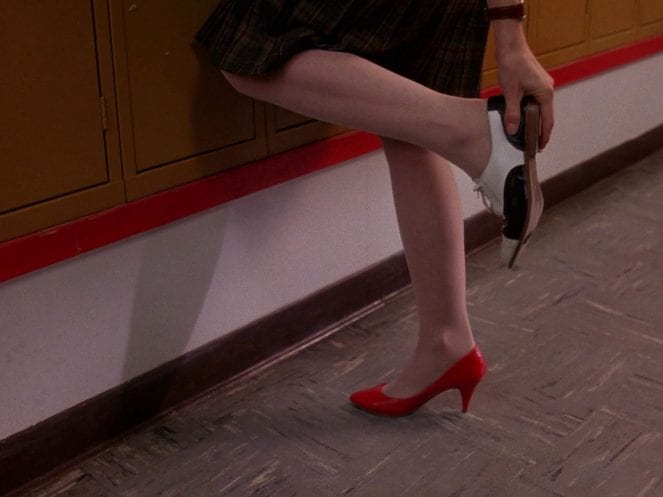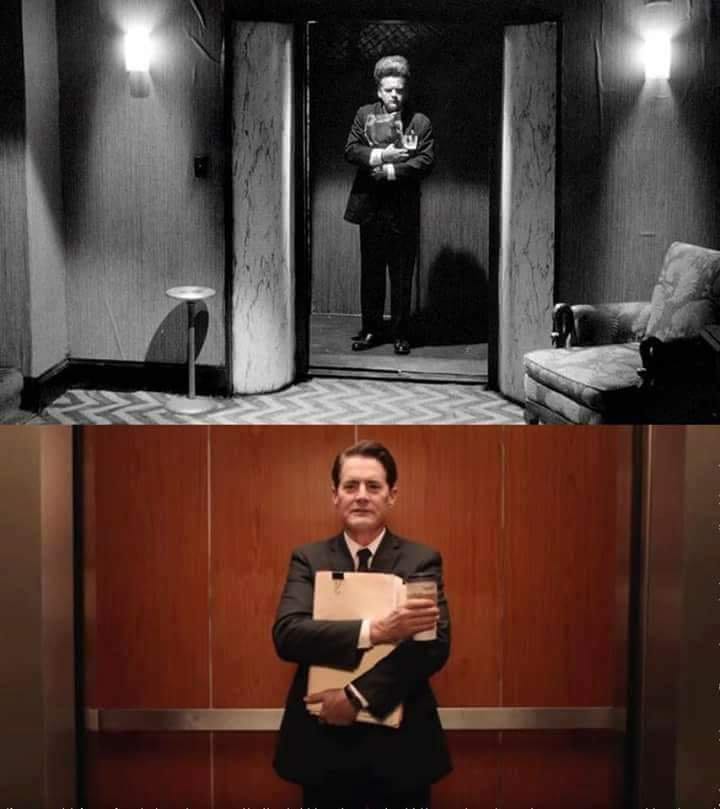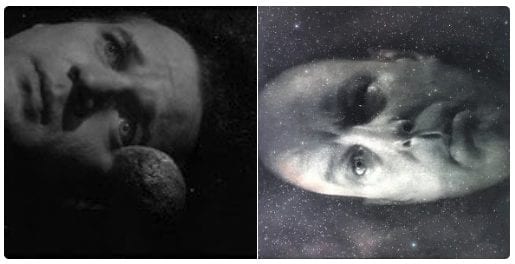Welcome back to our column showcasing the art and artists inspired by Twin Peaks, and in some cases other Lynch works. This time around I chat to H. Perry Horton, previously of OnePerfectShot, and now CinemaGrids, who has previously published Between Two Worlds: Perspectives on Twin Peaks, and is now releasing a free serial novel Twin Peaks: The Founding. He’s also written movies, more books, and is apparently dedicated to making us all look really lazy in comparison.
25YL: One Perfect Shot. You were working on that with Geoff Todd. How did you get involved with what he was doing, and how did that partnership develop?
HPH: Geoff and I had been friends a few years when he launched OPS (One Perfect Shot). We both lived in Portland, OR at the time and met through a video store I managed. We worked on a pair of documentary projects that came close to fruition – one on John Carpenter and one on Elvira, Mistress of the Dark – but ultimately fell through. While we were putting together some other stuff, Geoff started the OPS Twitter feed, and it just blew up. About a year into that he turned it into a site with articles, lists, and whatnot, and needed a writer. I’m a writer, and more important, I think and speak pretty much exactly the same as Geoff, so it made for a real uniform voice for the site. I also work for free; that was a big selling point, I think.
 TWIN PEAKS (1990) – Episode: “Pilot”
TWIN PEAKS (1990) – Episode: “Pilot”DP: Ronald Víctor García | Director: David Lynch
25YL: When One Perfect Shot was purchased by Film School Rejects, was that a big transition or pretty seamless? Did you find that the combination of those resources has improved your experience working on these projects?
HPH: From a technical standpoint it was seamless. The FSR (Film School Rejects) team is a very streamlined and professional operation, so everything on that side of things was smooth as silk. Ideologically was a bigger shift, for me. Geoff stepped away when the merger was completed, and I was absorbed by FSR. I was given absolute freedom to continue sourcing my own articles in addition to some other daily assignments, but for me the passion wasn’t there like I thought it should be. OPS was a film appreciation site. We didn’t do film reviews, we didn’t cover news, we didn’t focus on upcoming releases; we weren’t a business, we were just a fan site with a huge following. But FSR is a business, and a good one. They operate like a more “traditional” film site with all the stuff I just mentioned plus columnists, think pieces, interviews, DVD reviews et cetera. And there’s absolutely nothing in the world wrong with that, it’s just that I’m not a journalist, I’m not a critic, so that kind of work isn’t really in my career arc. So, after about a year, last fall around the time my kids came along, I left FSR.
25YL: A Variety article at the time of the purchase stated that you would be a managing editor. Now, the site shows you as Video Content Editor of Film School Rejects. How did that come about? What have you learned in assuming that role?
HPH: Managing Editor had been my title at OPS because I had been managing most of the content. For the majority of our run I was the sole writer, besides Geoff, who managed the Twitter feed exclusively, a huge job in and of itself. At FSR, they had all that stuff in good hands, so I shifted to Video Content Editor, which meant I found video essays on cinematic topics and wrote them up. It was the same work, basically, I was doing for OPS, just with less management responsibilities.
25YL: You write for Film School Rejects, have written six screenplays, five books and have two children, and are still launching other projects. Are you getting any sleep? Truly though, how do you balance all of these projects? Is it a professional desire or passion at play?
HPH: There’s a line in “NY State of Mind” on Nas’ Illmatic album, which came out when I was in high school, that goes, “I never sleep, ‘cause sleep is the cousin of death.” That line for whatever reason latched onto me and pops in my head every single time I feel too tired to work. Between work, and my day job, and my wife and kids, I get about five good hours of sleep a night. I don’t advise it, but it works for me. In terms of balancing different projects, it’s all about schedule and routine. I have pockets of free time during the day – an hour here, an hour there – and there’s an order to what I do when: project A first, project B second, CinemaGrids posts third et cetera. Once this routine is established, I don’t find it as tricky to switch mindsets between projects.
Preparation is also key. Everything I write, fiction or otherwise, gets thoroughly outlined before I start drafting. Those outlines serve as maps I can pick up at any point and time and know exactly where I am. And it’s all about passion, it has to be. If you get into writing thinking you’re going to make money, you’re either dangerously naïve or dangerously confident. That’s not to say you can’t eke out a living as a writer, but money can’t be your primary motivation, because there are millions of writers out there and most are willing to work for free. So if you’re going to give so much of yourself that by contemporary success standards is going to give you so little in return, passion is the only thing that can fuel you, and it’s the only thing that can help you achieve real success: a sense of accomplishment and a clear, received communication with others. Besides, passionless writing is horrible to read, there’s no soul to it, it’s just an exercise in verbosity and a waste of everyone’s time.
 David Lynch, elevators, and men in black suits clutching personal belongings: ERASERHEAD and TWIN PEAKS: THE RETURN.
David Lynch, elevators, and men in black suits clutching personal belongings: ERASERHEAD and TWIN PEAKS: THE RETURN.25YL: Tell us about CinemaGrids. You’ve been doing that for two years? How does that differ from One Perfect Shot for you?
HPH: I started CinemaGrids in September of 2016 for basically the same reason Geoff started OPS: as a Twitter feed to catalogue some of my favorite cinematic moments. Difference is, where OPS focuses on single frames of cinematography, CG is about filmic comparisons, like the overhead shots of Quentin Tarantino, or the color spectrum of Blade Runner 2049, or the aesthetic and narrative similarities between Lost in Translation and Her. It’s just a fun way for me to increase my knowledge and understanding of film and share it with others.
25YL: A quick glance at the weather tells us summer is here, which means Shark Week is coming. Did you have good experiences working with Asylum films on your screenplays? How did you end up writing shark and disaster movies anyway?

HPH: I loved working with The Asylum. I learned so, so much so quickly from those guys. The six scripts I wrote for them were all done in a two-year period, or one script every four months. It was a film school in and of itself, and it truly changed me as a writer, not just a scriptwriter, but a teller of stories. Before The Asylum, I had ideas and drive, but the skills I learned with The Asylum gave me structure, they showed me a practical approach to a passion, and that has made a world of difference in my process and productivity. As for how I fell into it, believe it or not, it was through blogging. I was working as a buyer for a video store when The Asylum started releasing. I’ve always been a schlock fan, and when I noticed all these films were coming from the same studio, I started a blog dedicated solely to their output. Four months later I was invited by the producers to join their writers pool. Two months after that I was starting my first feature, A Haunting in Salem.
25YL: You recently embarked on #MyCriterionJourney. Can you tell us about that, and when you first discovered Criterion.
HPH: #MyCriterionJourney is a quest to see every single film in the Criterion Collection, some 950+ titles and counting. I’ve been a fan of the collection for decades and have seen hundreds of their titles before, but I turned 40 this year, so I thought it would make for a nice emblematic renewing of my vows to cinema, so to speak, and a chance to broaden my horizons.
..they say every seven years or so every single molecule in your body is replaced, meaning every seven or so years you’re technically an entirely new person; that guy wants to watch Eraserhead, too.
25YL: Do you have a top three Criterion films, and do you think your view of the films has changed as you’ve grown older?
HPH: My three favorite Criterions, today at least, are: Stalker, Under The Volcano, and Spirit of the Beehive. A major motivation for going on #MyCriterionJourney was the belief that movies, like literature or music or visual art, mean different things to you at different points of your life. For example, I’ve seen Goonies a hundred times at least, but it’s only in the last few months that I’ve seen it not as a child, but as a parent, and that changes a good deal about how a film feels, resonates, and effects you. Or hell, let’s stick to topic and talk about Lynch. I didn’t understand Eraserhead half as much at 25 as I do at 40. One of the great things about being human is that our understanding of the world never recedes, it only increases as we go through life. You have new eyes every day, figuratively and somewhat literally – they say every seven years or so every single molecule in your body is replaced – meaning every seven or so years you’re technically an entirely new person; that guy wants to watch Eraserhead, too.
25YL: You were working on and putting out Between Two Worlds: Perspectives on Twin Peaks during a flurry of output in everyone’s anticipation for Season 3. Did you enjoy working on that and get good feedback from fans?
HPH: Writing Between Two Worlds was one of the most rewarding creative experiences of my writing life, mostly because I didn’t plan it. Back when I was at OPS, I wanted to write a weekly column. I also, at the same time, moved from Portland to rural Washington state, prime Twin Peaks territory, so it was on my mind. I pitched the idea to Geoff, “Twin Peaks Tuesdays,” and he went for it, mostly because it was Lynch, and cinematic. I started with the essays that make up the latter half of Between Two Worlds, and once The Return was announced, I started the Season 1 & 2 episode guide that makes up the first half. All of a sudden I found myself with a couple hundred pages on the same topic, so I published them. The response from other fans has been great, and very humbling. But most importantly, I’ve met a lot of really cool people through the book, people who have expanded how I think about the series, and whose thoughts and ideas have challenged my own in the most fruitful of ways. I went in to the book thinking I was an expert, and came out thinking I was not, and honestly, that’s the best possible outcome, because it’s only encouraged me to try and get smarter about my own work, and my work relating to Twin Peaks.
Twin Peaks is the best kind of mystery, the kind of Poe…where the solution isn’t the thing, the mystery itself is, the hunt. And we’re all hunters.
25YL: Twin Peaks is obviously a passion of yours. When did you first come across it, and why do you think it inspires people so much?
HPH: I remember my folks watching at least some of the original series when it aired, but I was only 12 at the time so it was over my head. I got into it in earnest my freshman year of college, the same year Lost Highway came out. By then I was a Lynch fan, having seen Wild at Heart, Blue Velvet, Eraserhead, and Dune in high school. Lost Highway is what did it, though. That flick blew my fucking mind, it was, and you have to understand the temporal context, there was nothing like this, narratively-speaking, in mainstream cinematic existence. I saw the film half a dozen times in the theater just trying to figure it out. It was so interactive, so enmeshing, that I had to go through everything Lynch had done. That started with Twin Peaks, his most major work. I was hooked by the time Sarah Palmer dropped the phone and started screaming. I have never stopped being hooked by it since. I think the reason it’s so inspiring is because it’s so – like I said about Lost Highway, and like you could say about Mulholland and Inland and The Return – it’s so interactive, it demands your participation as more than a viewer but a thinker, it doesn’t work if you aren’t working with it. Twin Peaks is the best kind of mystery, the kind of Poe, the opposite of Doyle, where the solution isn’t the thing, the mystery itself is, the hunt. And we’re all hunters.
I honestly consider it the best thing to ever air on television, and I think its greatest virtue is that it opens a hundred new doors of the narrative…
25YL: What was your opinion on The Return. Was it anything like what you expected?
HPH: I don’t know that I had any expectations entering The Return other than I expected it to be as much of a watershed moment, personally, as the original series was. And in that regard, The Return was a 1000% success. I honestly consider it the best thing to ever air on television, and I think its greatest virtue is that it opens a hundred new doors of the narrative, there are now more depths to plunge than ever, and that’s all a Twin Peaks’ fan wants in the end: a bigger mystery.
25YL: You’ve just published the fifth chapter of the serial novel, Twin Peaks: The Founding. What inspired that, and did it go where you expected it to?
HPH:Twin Peaks: The Founding is an ongoing serial novel; I’m releasing one chapter a month over at my site. Book One is going to run 12 chapters, through this year, and Book Two – which is fully plotted and a third written already – will be another 12 chapters, so I have enough material at present to publish through all of 2019. And I’m just getting started. The idea came out of all the speculation as to whether or not there’d be a fourth season of Twin Peaks. We live in an age of cinematic universes, and naturally that led me to think about the myriad ways you could continue the series. A month before the series ended, I wrote for FSR a list of 17 possible Twin Peaks spinoffs, but oddly enough, a founding-scenario isn’t among them. The idea didn’t come to me until Christmas of last year. I was in India with my wife getting our boys – we adopted young brothers from there – and we were all stuck in a hotel for about six weeks waiting for various papers and legal hurdles to be cleared. The Snohomish Historical Society around that time tweeted a photo of the Falls circa 1900, and just like that it hit me. I sent out my own tweet, suggesting that season 4 be a total reset that focused on the settling of town in the 19th century, and in the hours that followed, the response I got and the ideas that started forming convinced me I had to just write the damn thing myself. So I plotted in India and started writing once we got back to the States. I have enough ideas for five books – or five years – at least. I don’t plan on stopping until I run out of ideas, and given my experience with myself, that won’t be anytime soon.
25YL: Any plans to publish The Founding as a print novel?
HPH: That’s a tricky question, because I don’t know the legal ramifications of making money on fan fiction. This is why I’m just giving away the novel for free on my site. The characters I’m writing about, the town, the scenario, this is all descended from the work of Frost and Lynch, this is their story, just my extrapolation. I’d feel weird charging people for the work, which means publishing a print version is probably out of the question.
25YL: Any future plans you can tell us about?

HPH: Project B right now is something I’ve been thinking about for a few years and have finally decided to start researching and writing: The Unified Theory of Twin Peaks – how Eraserhead, Blue Velvet, Twin Peaks, Lost Highway, Mulholland Drive, Inland Empire, The Return, and a couple short films and paintings by Lynch are all a part of the same, overarching story taking place in the same multiverse. It’s not the story of Coop or Laura, like we might think, but rather the story of The Lodge, its origins, inhabitants, and influence. The idea is a tributary off my Mulholland Drive / Twin Peaks theory, and it’s a project I’m very, very interested in diving into. It’s going to be a couple or few years of work – the research alone, even going into it with a lot of knowledge on the subject, is going to be exhaustive – but I’m ready to pledge myself to it, even though it’s a for-fun-theory, more of a literary-critical experiment, not something I believe Lynch actually intended. It’s also a nice way to continue educating myself on Twin Peaks while I keep writing The Founding.
25YL: Sounds like the kind of deep-dive we love around here. We’ll definitely be keeping our eyes open for that. Thanks for taking the time to talk to us Perry!
You can read Twin Peaks: The Founding on the website and follow Perry’s varied antics on Twitter at his personal account, or his CinemaGrids account.



